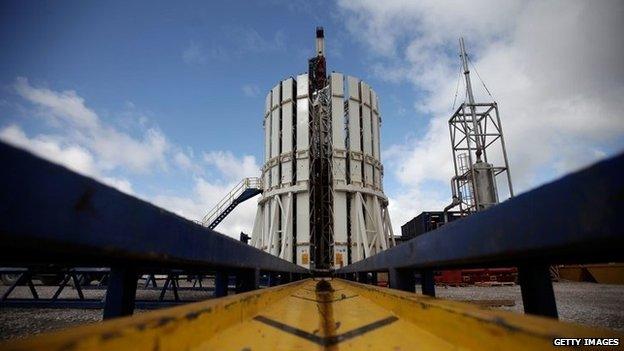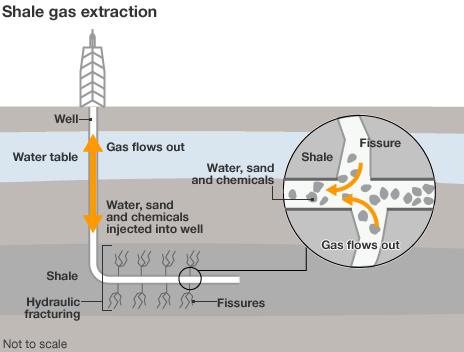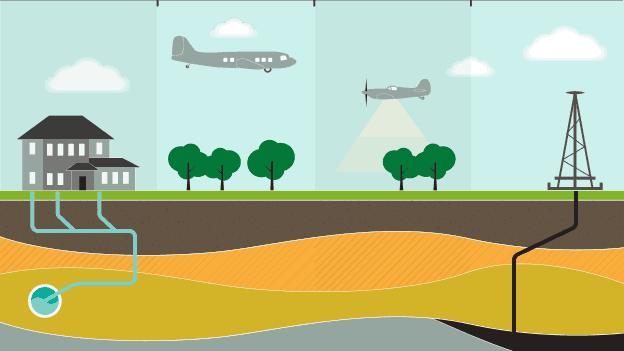Ministers want to change trespass law to boost fracking
- Published
- comments

Ministers want to give energy companies the right to run shale gas pipelines under private land, Whitehall sources have confirmed.
The planned move - aimed at kick-starting the fracking industry - will be included in the Queen's Speech as part of an Infrastructure Bill.
The companies will still need planning permission to drill for shale gas.
But they will be able to install pipes to transport the gas under private land without fear of breaking trespass laws.
Prime Minister David Cameron has also indicated that the government could cut subsidies for land-based wind farms when it has "built enough to meet all our targets".
'Obstacles'
Ministers fear landowners and anti-fracking protesters would use existing law to block shale gas extraction in the UK, as it suggests prior permission is needed to run pipelines thousands of feet below private land.
BBC political correspondent Iain Watson said the Infrastructure Bill would make clear that putting pipes under private land would not constitute trespass - but it would also give the affected landowners the right to compensation.

Ministers are worried that other countries - especially in eastern Europe - have been making fracking there appear more attractive to investors than Britain.
They believe a clarification in the law will send a positive signal to companies.
The prime minister's official spokesman confirmed the government was looking at ways of making test drilling easier and to ensure there was not "an overburden of red tape and regulation".
He added: "Fracking is something that is very new, certainly in this country, which is why we are looking to see whether there are particular obstacles to the test drilling."
A conference on the potential economic benefits of fracking is to be held in Blackpool on Thursday.
The Infrastructure Bill would also give new freedoms to the Highways Agency in a bid to get more roads built, and planning changes to fast-track developments, according to The Financial Times., external
Mr Cameron and Chancellor George Osborne joined forces on Tuesday to promote the UK's construction programme.
The pair, who visited road building schemes, claimed more than 200 rail, road, local transport, broadband, airport and waste management projects were due to start construction over the next year, creating more than 150,000 jobs.
Downing Street said the jobs figure had been calculated using Office for National Statistics data.
The government says £36bn is being spent on the projects, which include flood damage repairs. That figure is made up of £5bn in public investment, £21bn private and £10bn in joint funding.
Mr Cameron said: "This government is backing business with better infrastructure so that more jobs and opportunities are created for hardworking people, meaning more financial security and peace of mind for families."
He also indicated that the government could look at cutting subsidies on land-based wind farms in the future.
Visiting the UK headquarters of the construction group Skanska, in Hertfordshire, the prime minister said: "We have now got the largest offshore wind farm anywhere in the world built off the coast of the UK and another one coming on stream almost as big very, very shortly.
"In terms of onshore wind, obviously there will come a time when we will have built enough to meet all our targets and so I've always said with subsidies, we shouldn't keep subsidies for longer than they are necessary and so that's something we'll be looking at."

Labour said the government's "reheated announcements" about infrastructure masked a failure to deliver and the lowest level of peacetime housebuilding since the 1920s.
Shadow Treasury minister Chris Leslie said: "We need action not words on infrastructure if we're to get a recovery built to last."
According to the Office for National Statistics infrastructure spending fell 11.4% in 2012 but went up by 2% last year.

How land ownership rights have evolved

Before the twentieth century it was assumed a land owner's rights extended from the centre of the earth to the top of the sky. But a series of key court cases have challenged that notion.
1931: US court rules that a sewer 150ft deep was not on land belonging to the home owner above.
1946: US Supreme court rules that transcontinental flights do not trespass on land below.
1978: High Court of England and Wales says aerial photography plane was not trespassing.
2010: UK Supreme Court rules that diagonal drilling down to 2,800ft from an adjacent plot of land is still trespassing under the surface.
- Published29 January 2014

- Published7 April 2014
